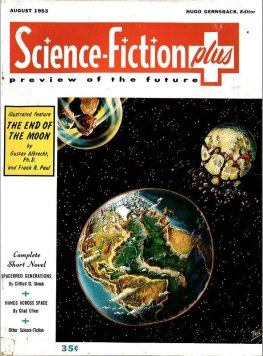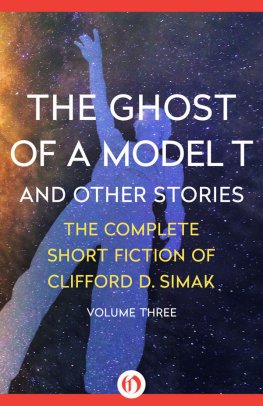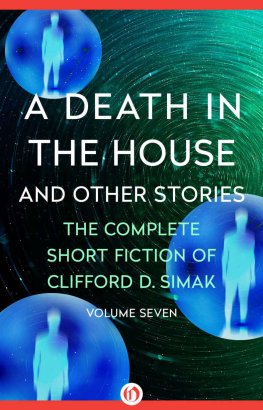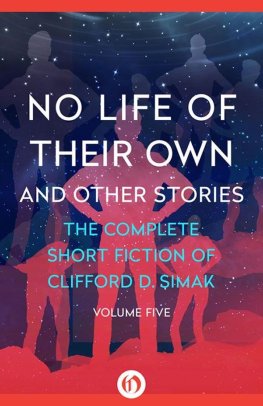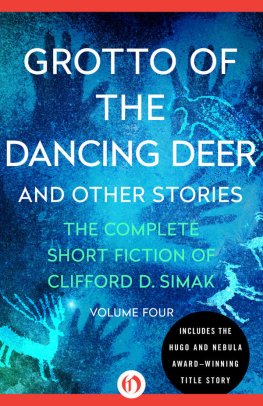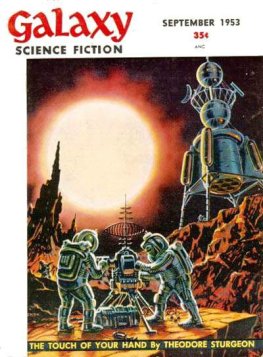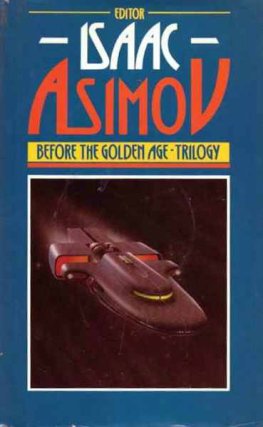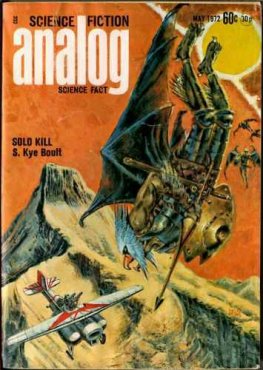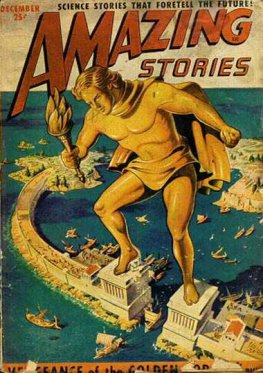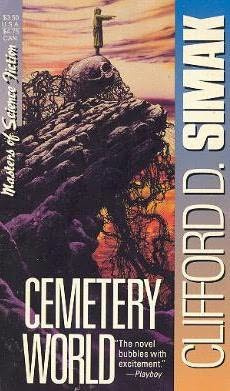Spacebred Generations
by Clifford D. Simak

THERE had been silencefor many generations. Then the silence ended. The Mutter came at "dawn." The Folk awoke, crouching in their beds, listening to the Mutter. It had been spoken that one day would come the Mutter? And that the Mutter would be the beginning of the End? Jon Hoff awoke, and Mary Hoff, his wife.
They were the only two within their cubicle, for they had no children. They were not yet allowed a child. Before they could have a child the elderly Joshua must die before there would be room for it, and knowing this they had waited for his death, guilty at their unspoken prayer that he soon must diewilling him to die so they might have a child.
The Mutter came and ran throughout the Ship. Then the bed in which Jon and Mary crouched spun upward from the floor and crashed against the wall, pinning them against the humming metal, while all the other furniturechest and chairs and tablecame crashing from floor to wall, where it came to rest, as if the wall suddenly had become the floor and the floor the wall.
The Holy Picture dangled from the ceiling, which a moment before had been the other wall, hung there for a moment, swaying in the air; then it, too, crashed downward.
In that moment the Mutter ended and there was silence once again but not the olden silence, for although there was no sound one could reach out and pinpoint, there were many soundsa feeling, if not a hearing, of the sounds of surging power, of old machinery stirring back to life, of an old order, long dormant, taking over once again.
Jon Hoff crawled out part way from beneath the bed, then straightened on his arms, using his back to lift the bed so his wife could crawl out, too. Free of the bed, they stood on the wall-that-had-become-a-floor and saw the litter of the furniture, which had not been theirs alone, but had been used and then passed down to them through many generations.
For there was nothing wasted; there was nothing thrown away. That was the lawor one of many lawsthat you could not waste, that you could not throw away. You used everything there was, down to the last shred of its utility. You ate only enough foodnor more, no less. You drank only enough waterno more, no less. You used the same air over and over againliterally the same air. The wastes of your body went into the converter to be changed into something that you, or someone else, would use again. Even the deadyou used the dead again. And there had been many dead in the long generations from the First Beginning. In months to come, some day perhaps not too distant now, Joshua would be added to the dead, would give over his body to the converter for the benefit of his fellow-folk, would return, finally and irrevocably, the last of all that he had taken from the community, would pay the last debt of all his debtsand would give Jon and Mary the right to have a child.
For there must be a child, thought Jon, standing there amidst the wreckage there must be a child to whom he could pass on the Letter and the Reading.
There was a law about the Reading, too. You did not read because reading was an evil art that came from the Beginning and the Folk had, in the Great Awakening, back in the dimness of Far Past, ferreted out this evil among many other evils and had said it must not be.
So it was an evil thing that he must pass on, an evil art, and yet there was the charge and pledgethe charge his long-dead father had put upon him, the pledge that he had made. And something else as well: The nagging feeling that the law was wrong.
However, the laws were never wrong. There was a reason for them all. A reason for the way they lived and for the Ship and how the Ship had come to be and for those who peopled it.
Although, come to think of it, he might not pass the Letter on. He might be the one who would open it, for it said on the outside of the envelope that it was to be opened in emergency. And this, Jon Hoff told himself, might be emergencywhen the silence had been broken by the Mutter and the floor became a wall and the wall a floor.

Now there were voices from the other cubicles, frightened voices that cried out and other voices that shrieked with terror, and the thin, high crying of the children.
"Jon," said Mary Hoff, "that was the Mutter. The End will be coming now."
"We do not know," said Jon. "We shall have to wait and see. We do not know the End."
"They say ..." said Mary, and Jon thought that was the way it always was.
They say. They say. They say.
It was spoken; it was not read nor written.
And he heard his dead father speaking once again, the memory of how he had spoken long ago.
"The brain and the memory will play you false, for the memory will forget a thing and twist it. But the written word will stay forever as it was written down. It does not forget and does not change its meaning. You can depend upon the written word."
"They say," said Mary, "that the End will come swiftly when we hear the Mutter. That the stars will no longer move, but will stand still in the blackness and that is a sure sign the End is near at hand."
And, he wondered, the end of what? The end of us? The end of the Ship? The end of the stars themselves? Or, perhaps, the end of everything, of the Ship and stars and the great blackness in which the stars were spinning.
He shuddered to think of the end of the Folk or of the Ship, not so much that the Ship should end or that the Folk should end, but that the beautiful, efficient, well-balanced order in which they lived should end. For it was a marvelous thing that every function should be so ordered that there always would be enough for the Folk to live on, with never any surplus. No surplus of food or water or air, or of the Folk themselves, for you could not have a child until someone assigned against the coming of that child should die.
There were footsteps running in the corridors outside the cubicles and excited shouting, and suddenly there was someone pounding on the door.
"Jon! Jon!" the voice shouted. "The stars are standing still!"
"I knew it!" Mary cried. "I told you, Jon. It is as it was spoken."
Pounding on the door!
And the door was where it should have been, where a door logically should be, where you could walk straight out of it to the corridor, instead of climbing the now-useless ladder that ran ridiculously to it from the wall-that-used-to-be-the-floor.
Why didn't I think of that before? he asked himself. Why didn't I see that it was poor planning to climb to a door that opened in the ceiling?
Maybe, he thoughtmaybe this is the way it should have been all the time. Maybe the way it had been before was wrong. As the laws might well be wrong.
"I'm coming, Joe," said Jon's voice.
He strode to the door and opened it and he saw that what had been the wall of the corridor was now the floor and that many doors were opening into it directly from the cubicles and that folks were running up and down the corridor and he thought: We can take down the ladders now, since we have no use for them. We can feed them into the converter and that will give us the margin that we never have.
Joe gripped him by the arm.
"Come with me," he said.
They went to one of the topsy-turvey observation blisters. The stars were standing still.
Exactly as it had been spoken, the stars were still.
It was a frightening thing, for now you could see that the stars were not simply spinning lights that seemed to move against the flatness of a dead-black curtain, but that they were hanging in an emptiness that took the pit out of your stomach and made you gasp and clutch the metal of the ports, fighting to keep your balance, fighting off the lightheadedness that came upon you as you stared into a gulf you could not understand.

